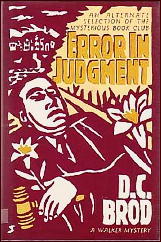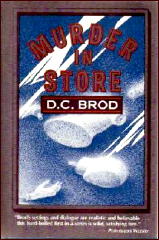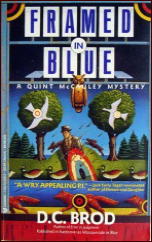Sun 25 Sep 2011
Archived Review: D. C. BROD – Error in Judgment.
Posted by Steve under Bibliographies, Lists & Checklists , Characters , Reviews[11] Comments
D. C. BROD – Error in Judgment. Diamond, paperback reprint, September 1991. Hardcover edition: Walker, July 1990.
As you’ve probably noticed, paperbacks are making quantum jumps in terms of prices. I’m not sure where the upper limit is, in terms of public resistance to bigger and bigger chunks of available spending money, but so far nothing seems to be keeping the cost of reading material from jumping onward and upward, from one month to the next, or so it seems.

(Compare the price of this book, $4.50, with the one by Stefanie Matteson that I reviewed just prior to this one, $3.95, from the same publisher. Compare it with the price of paperbacks at the time you’re reading this, several months from now.)
But as for the question, “Is this book worth $4.50?,” I’d hesitate a little, but I’m going to say yes. I enjoyed it (and enjoyed it more than I thought I was going to, after the first couple of chapters). It’s a good-sized book, 258 pages of smallish print, and if you enjoy PI stories, I think you’ll be getting your money’s worth.
On the other hand, a general rule of thumb is that you may want to be careful of PI books written by authors with initials for a first name. The “D” stands for Deborah, and by and large, women still don’t write hardboiled PI novels. (But neither did Rex Stout. All I’m saying is be wary.)
Brod’s detective hero is Quint McCauley, a struggling PI new to the small town of Foxport, somewhere outside of Chicago. He’s already made the mistake of crossing one of the town’s leading legal lights, and jobs are getting hard to come by.
One that he has in this case, accepted on a contingency basis, is that of trying to determine whether or not a judge’s death was really a suicide. A clause in an insurance policy means a difference of a million dollars, payable to the widow.
The judge, by the way, was under indictment in an bribery case, but Quint still wonders why the case was closed so quickly by the police department. (He is also on the outs with the chief of police, you might be interested in knowing, ever since he tried to pick up the man’s wife in a bar some time earlier.)
Quint does have the advantage over the police, as far as the case is concerned, in that he was the one who found the body. He was also the one who found (and went off with) the pictures he found stashed away in a filing cabinet. He shouldn’t have, and that’s where the title comes from.
It’s a complex case, in other words. The difficulty I found with it, in the early going, is that the writing is talky and flat, and McCauley, who tells the story, sounds whiney and apologetic, almost to the point of exasperation.
Points of the story where he should be angry, he says he’s angry, but he doesn’t seem angry and he doesn’t act angry. (Maybe he’s more cold-blooded than I thought he was.)
If you decide to read it, though, bear with it, and you’ll eventually find the plot has enough twists, major and minor, to make it worth the effort. This is a mixed review, in other words, but in balance, it should read more positive than negative.
Rating: B Minus.
The Quint McCauley series —
1. Murder in Store. Walker, 1989.

2. Error in Judgment. Walker, 1990.
3. Masquerade in Blue. Walker, 1991. Reprinted as Framed in Blue, Diamond, 1993.

4. Brothers in Blood. Walker, 1993.
5. Paid in Full. Five Star, 2000.
[UPDATE] 09-25-11. Here it is, some twenty years later, not just a few months, and while prices of mass market paperbacks seem to have stabilized in the past year or so, it’s at a level that’s essentially double it was in 1991.
The bigger problem, as far as I see it, is the total lack of diversity that exists in the way of detective fiction published today in MMP. Many publishers no longer have lines of genre fiction, and of those that do, almost all of it is of the “cozy” variety, with protagonists more interested in their hobbies (quilting, teddy bears) or small shops (antiques, herbs) than they are in solving murder cases, mostly incidental.
In my opinion, ebooks will soon force MMP publishing into oblivion, a sad day as far as I’m concerned, but as other people have also pointed out, I’ll still have plenty to read.
September 25th, 2011 at 9:26 pm
Books such as these still are published by small press, but those publishers abandoned the mass market paperback long ago. Today this book would be published as a trade paperback for listed price around fifteen dollars.
September 25th, 2011 at 9:55 pm
I agree. Small independent publishers are keeping the field of mystery and detective fiction alive, whether in terms of new books or reprints from the past.
The major publishers are looking for bestsellers only, so there doesn’t seem to be a lot of opportunity for new authors to work their way up.
Another question is, can the small publishers pay enough for new authors (and old ones as well) to make their writing more than a hobby?
With Borders gone, considering the tons of mass market paperbacks they sold, I don’t see the format hanging around for much longer.
Even though I don’t own a Kindle or Nook, and I probably never will, ebooks may be big part of the solution.
September 25th, 2011 at 10:31 pm
I giggled at the NY Times declaring the mass market paperback will not last until next summer.
I love my Kindle and Mac Kindle, but did you read the latest number of people with e-readers? The “e-book will take over the world” fans got all excited about a study that found one out of six people own a e-reader. But I wonder what the five out of six people who don’t own an e-reader are reading?
September 25th, 2011 at 11:02 pm
It depends. Maybe the other five don’t read at all. Other than what’s on their computers, I suspect a lot of people don’t read anything.
September 26th, 2011 at 12:11 am
Steve, our own little ray of sunshine.
Last figures I read had around thirty three percent of Americans own computers. Reportedly, forty percent of American live in poverty. When you can barely afford food, housing and taxes, those “cheap” e-readers are out of your price range.
Media leads us down a false trail of worry and fear because it has always “sold papers”. It is harder to accept there are other reasons for the drop in print sales. That the percent rise of e-books does not reflect that less than fifteen percent of readers chose e-books.
And relax. No matter how successful the e-book format becomes, it will not take away the pulp magazines or mass market paperbacks of the past.
September 26th, 2011 at 7:10 am
It reminds me of television, where cable shows with no more than a few million viewers get the hype and are called “hits” even though theyr have a fraction of the audience of even today’s network offerings.
Yes, I see people with ereaders but not all that many. And no, I still haven’t taken that plunge yet.
September 26th, 2011 at 2:39 pm
I seem to have cleverly diverted the discussion away from the book at hand to one mostly about ebooks that’s taken place.
Otherwise maybe someone might have spotted the line “… by and large, women still don’t write hardboiled PI novels…” and said something about it.
Unless, of course, what I said was true, and it’s still true today.
September 26th, 2011 at 5:31 pm
But fewer men are writing about the PI. Kelli Stanley and Linda L. Richards have wrote books featuring a hardboiled PI.
Today most hardboiled mysteries feature cops or someone caught in the middle. Anyone who has read Megan Abbott or Tana French knows women can be a hardboiled as the next guy.
September 26th, 2011 at 8:14 pm
Tana French, yes. I would consider Megan Abbott to be a Noir writer, in the Cornell Woolrich vein, more than hard-boiled.
One author writing hard-boiled PI novels then and now is Sara Paretsky.
Most of the PI novels written by men today seem to be published by the indy presses, but not all, by any means.
September 30th, 2011 at 12:25 pm
I have a hunch I read a book by D.C. Brod and didn’t like it much. I don’t recall what it was, or if it was this series, just that it left me flat. If I’d really wanted this one, I’d have hesitated at the original price and gone looking in a used book store. Now, of course, most of those are gone, and old paperbacks are too, unless one wants to buy from an internet dealer. I won’t go into the ebook discussion, I think all concerned know my feelings on that.
September 30th, 2011 at 3:40 pm
Maybe it’s not too surprising, Richard, but I think you’re the first person to actually say something about Brod and her Quint McCauley books.
The comments gone off in other directions, and I’m sure it’s because very few people have ever read one of her books.
Reading my own review again, if the one you read left you flat, I don’t think we’re very far apart. I have a feeling, though, I was a little more positive about the experience than you were. Not a whole lot, but a little.